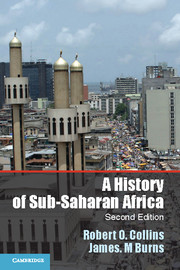Book contents
- Frontmatter
- Dedication
- Contents
- Acknowledgments
- Introduction
- Part I Foundations
- Part II Africa in World History
- Part III Imperial Africa
- Part IV Independent Africa
- 22 Nationalism and the independence of colonial Africa
- 23 The Union of South Africa and the apartheid state
- 24 A decade of hope
- 25 Cold War Africa
- 26 Africa at the beginning of the twenty-first century
- Index
- References
24 - A decade of hope
Published online by Cambridge University Press: 05 June 2014
- Frontmatter
- Dedication
- Contents
- Acknowledgments
- Introduction
- Part I Foundations
- Part II Africa in World History
- Part III Imperial Africa
- Part IV Independent Africa
- 22 Nationalism and the independence of colonial Africa
- 23 The Union of South Africa and the apartheid state
- 24 A decade of hope
- 25 Cold War Africa
- 26 Africa at the beginning of the twenty-first century
- Index
- References
Summary
There are few more bittersweet scenes in the history of modern African than the newsreel films taken on the night of March 6, 1957, to record the transfer of authority from British officials in the colony of the Gold Coast to the leadership of the independent Republic of Ghana. As the Union Jack of Great Britain was lowered and the Black Star flag of the Republic of Ghana was raised, President Kwame Nkrumah was joined by British dignitaries amid rejoicing and jubilant throngs dancing in the streets. It is a scene of African hope and triumph over European colonialism, but also one of reconciliation between the ruler and the ruled that symbolized the contemporary optimism of a peaceful and prosperous future for Ghana and the other African colonies.
Twenty-three years after the independence of Ghana, every colony on the continent had become independent, as the vast empires of Belgium, Great Britain, France, and Portugal were transformed into a checkerboard of sovereign states. These new nations were dramatically different from one another in size, population, economic development, and environments. Giant states such as the Congo and Sudan dwarfed the tiny territories of Togo, Benin, and Equatorial Guinea. The population of Nigeria alone accounted for nearly 20 percent of the continent, but the inhabitants of the kingdom of Swaziland amounted to less than 1 percent. Economically there was little industrial development outside South Africa. The Congo and Zambia had extensive mining industries, but the economies of the remaining new states of Africa were predominantly agricultural. Some such as Ghana, Senegal, Kenya, and Uganda possessed pockets of fertile agricultural land that supported a vibrant export economy. Other new states survived more on subsistence than cash crops and had little to offer from their regional economies apart from the export of human labor. Many straddled diverse ecological and geographic zones. Niger and Mauritania lay along the arid border between savanna and the Sahel and the Sahara of western Africa. Nigeria stretched from the rainforests of the Niger delta to the shores of the slowly evaporating Lake Chad. The Sudan extended from the sands of its Nubian desert in the north to savanna, swamp, and mountains in the south. Yet despite all these many differences, the leaders of these new states shared a common goal to assert their authority as sovereign, independent nations.
- Type
- Chapter
- Information
- A History of Sub-Saharan Africa , pp. 357 - 365Publisher: Cambridge University PressPrint publication year: 2013



